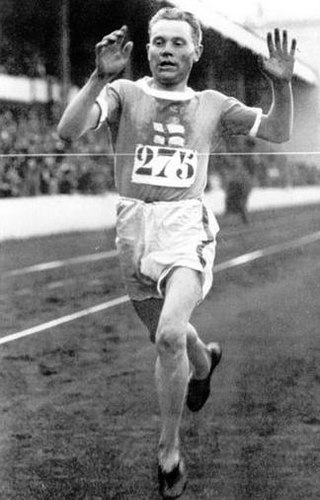
Paavo Johannes Nurmi was a Finnish middle-distance and long-distance runner. He was called the "Flying Finn" or the "Phantom Finn" because he dominated distance running in the 1920s. Nurmi set 22 official world records at distances between 1,500 metres and 20 kilometres, and won nine gold and three silver medals in his 12 events in the Summer Olympic Games. At his peak, Nurmi was undefeated for 121 races at distances from 800 m upwards. Throughout his 14-year career, he remained unbeaten in cross country events and the 10,000 metres.

Athletics is a group of sporting events that involves competitive running, jumping, throwing, and walking. The most common types of athletics competitions are track and field, road running, cross-country running, and racewalking.

Cross country running is a sport in which teams and individuals run a race on open-air courses over natural terrain such as dirt or grass. The course, typically 3–12 kilometres (1.9–7.5 mi) long, may include surfaces of grass and earth, pass through woodlands and open country, and include hills, flat ground and sometimes gravel road and minor obstacles. It is both an individual and a team sport; runners are judged on individual times and teams by a points-scoring method. Both men and women of all ages compete in cross country, which usually takes place during autumn and winter, and can include weather conditions of rain, sleet, snow or hail, and a wide range of temperatures.
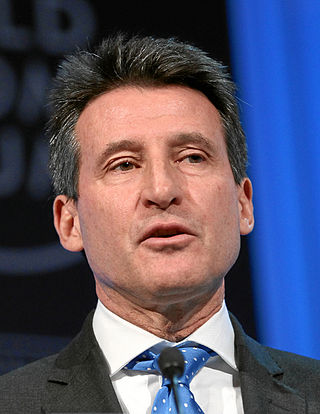
Sebastian Newbold Coe, Baron Coe,, often referred to as Seb Coe, is a British sports administrator, former politician and retired track and field athlete. As a middle-distance runner, Coe won four Olympic medals, including 1500 metres gold medals at the Olympic Games in 1980 and 1984. He set nine outdoor and three indoor world records in middle-distance track events – including, in 1979, setting three world records in the space of 41 days – and the world record he set in the 800 metres in 1981 remained unbroken until 1997. Coe's rivalries with fellow Britons Steve Ovett and Steve Cram dominated middle-distance racing for much of the 1980s.
Competitors at the Olympic Games have used banned athletic performance-enhancing drugs.

Joanne Marie Pavey MBE is a British long-distance runner representing Europe, Great Britain and England in a career notable for its longevity, range and consistency. A World, European and Commonwealth medallist, Pavey won her only senior title when she claimed the 10,000 m gold medal at the 2014 European Championships in Zürich, ten months after giving birth to her second child, to become the oldest female European champion in history at the age of 40 years and 325 days.

Finland first participated at the Olympic Games in 1908 and has sent athletes to compete in every Summer Olympic Games and every Winter Olympic Games since then. Finland was also the host nation for the 1952 Summer Olympics in Helsinki. Finnish athletes have won a total of 305 medals at the Summer Games, mostly in athletics and wrestling. Finland has also won 175 medals at the Winter Games, mostly in nordic skiing events.
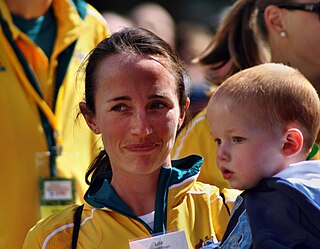
Lisa Jane Weightman is an Australian long distance runner and four time Olympian who specializes in the marathon event. At the 2020 Tokyo Olympics she came 26th in the Women's marathon with a time of 2:34.19, 7 minutes behind the eventual winner, Peres Jepchirchir.

Athletics at the 2016 Summer Olympics were held during the last 10 days of the games, from 12 to 21 August 2016, at the Olympic Stadium. The sport of athletics at the 2016 Summer Olympics was made into three distinct sets of events: track and field events, road running events, and racewalking events.

Athletics at the 2020 Summer Olympics were held during the last ten days of the Games. They were due to be held from 31 July – 9 August 2020, at the Olympic Stadium in Tokyo, Japan. Due to the COVID-19 pandemic, the games were postponed to 2021, with the track and field events set for 30 July – 8 August. The sport of athletics at these Games was split into three distinct sets of events: track and field events, remaining in Tokyo, and road running events and racewalking events, moved to Sapporo. A total of 48 events were held, one more than in 2016, with the addition of a mixed relay event.

The 100 metres at the Summer Olympics has been contested since the first edition of the multi-sport event. The men's 100 metres has been present on the Olympic athletics programme since 1896. The 100 metres is considered one of the blue ribbon events of the Olympics and is among the highest profile competitions at the games. It is the most prestigious 100 metres race at an elite level and is the shortest sprinting competition at the Olympics – a position it has held at every edition except for a brief period between 1900 and 1904, when a men's 60 metres was contested.

The 800 metres at the Summer Olympics has been contested since the first edition of the multi-sport event. The men's 800 m has been present on the Olympic athletics programme since 1896. The women's event was first held in 1928, making it the first distance running event for women. However it was not held again until 1960, since when it has been a permanent fixture. It is the most prestigious 800 m race at elite level. The competition format typically has three rounds: a qualifying round, semi-final stage, and a final between eight runners.

The 10,000 metres at the Summer Olympics is the longest track running event held at the multi-sport event. The men's 10,000 m has been present on the Olympic athletics programme since 1912. The women's event was added to the programme over seventy years later, at the 1988 Olympics. It is the most prestigious 10,000 m race at elite level. The competition format is a straight final between around 30 athletes, although prior to 2004 a qualifying round was held.
The 4 × 100 metres relay at the Summer Olympics is the shortest track relay event held at the multi-sport event. The men's relay has been present on the Olympic athletics programme since 1912 and the women's event has been continuously held since the 1928 Olympic Games in Amsterdam. It is the most prestigious 4×100 m relay race at elite level.

The steeplechase at the Summer Olympics has been held over several distances and is the longest track event with obstacles held at the multi-sport event. The men's 3000 metres steeplechase has been present on the Olympic athletics programme since 1920. The women's event is the most recent addition to the programme, having been added at the 2008 Olympics. It is the most prestigious steeplechase track race at elite level.
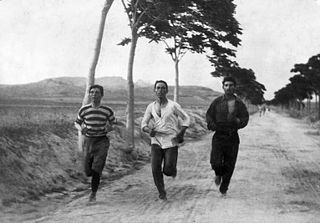
The marathon at the Summer Olympics is the only road running event held at the multi-sport event. The men's marathon has been present on the Olympic athletics programme since the first modern Olympics in 1896. Nearly ninety years later, the women's event was added to the programme at the 1984 Olympics in Los Angeles.
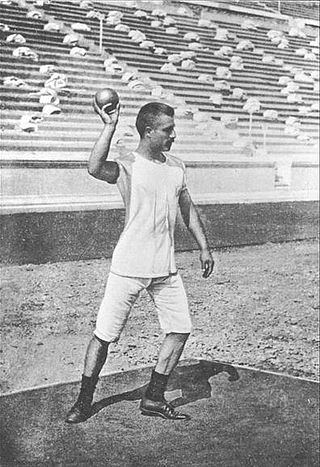
The shot put at the Summer Olympics is one of four track and field throwing events held at the multi-sport event. The men's shot put has been present on the Olympic athletics programme since 1896. The women's event was added to the programme at the 1948 Olympics just over fifty years later.

The hammer throw at the Summer Olympics is one of four track and field throwing events held at the multi-sport event. The men's hammer throw has been present on the Olympic athletics programme since 1900, becoming the third Olympic throws event after the shot put and discus throw. The women's event was a much later addition, being first contested at the 2000 Olympics.

The pole vault at the Summer Olympics is grouped among the four track and field jumping events held at the multi-sport event. The men's pole vault has been present on the Olympic athletics programme since the first Summer Olympics in 1896. The women's event is one of the latest additions to the programme, first being contested at the 2000 Summer Olympics – along with the addition of the hammer throw, this brought the women's field event programme to parity with the men's.

The men's marathon at the 2016 Olympic Games in Rio de Janeiro took place on the Sambódromo on 21 August, the final day of the Games. One hundred fifty-five athletes from 79 nations competed. The event was won by Eliud Kipchoge of Kenya, the nation's second victory in the event in three Games. Feyisa Lilesa of Ethiopia took silver, while Galen Rupp of the United States took bronze. The defending champion going into the marathon was Ugandan Stephen Kiprotich.

















